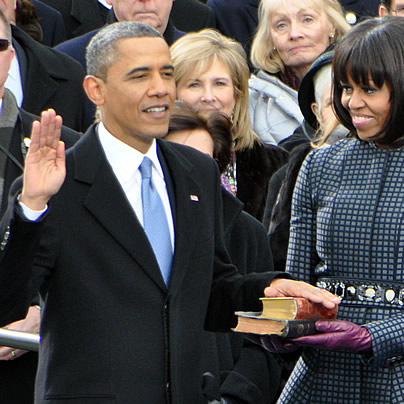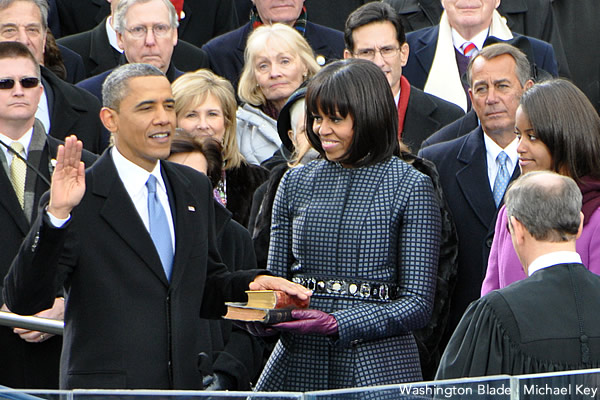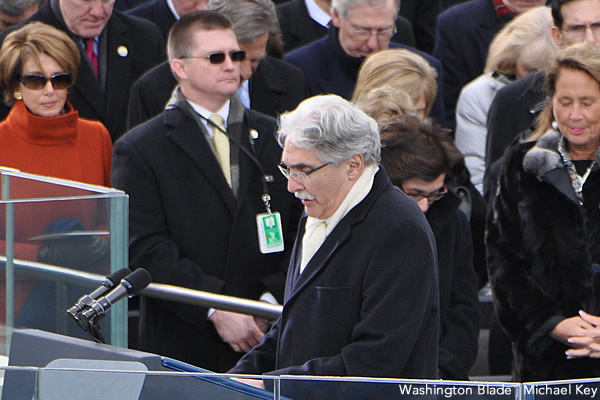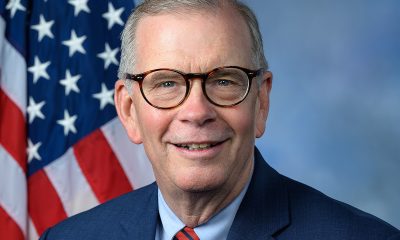National
Obama makes history at start of second term
In first, president includes gay references in address


President Obama made history by including gays and lesbians in his 2013 inaugural address in two references. (Washington Blade photo by Michael Key)
Marking the official start of his second term, President Obama on Monday included for the first-time ever explicit references to the LGBT community in a presidential inaugural speech — a powerful statement because of the symbolic nature of the widely watched speech as a reflection of the American spirit.
Following his swearing-in by Chief Justice of the U.S. Supreme Court John Roberts, Obama delivered the speech, which included many nods to his progressive base, including mentions of climate change, immigration reform in addition to a reaffirmation of the president’s earlier stated support for marriage equality.
“Our journey is not complete until our gay brothers and sisters are treated like anyone else under the law – for if we are truly created equal, then surely the love we commit to one another must be equal as well,” Obama said.
Obama made another reference to the LGBT community when he included a mention of the 1969 Stonewall riots in New York City, which are seen as the start of the modern LGBT rights movement.
“We, the people, declare today that the most evident of truths – that all of us are created equal – is the star that guides us still; just as it guided our forebears through Seneca Falls, and Selma, and Stonewall; just as it guided all those men and women, sung and unsung, who left footprints along this great Mall, to hear a preacher say that we cannot walk alone; to hear a King proclaim that our individual freedom is inextricably bound to the freedom of every soul on Earth,” Obama said.

(Washington Blade photo by Michael Key)
An estimated crowd of at least 500,000 filled the National Mall to hear Obama’s speech. Spectators were bundled in coats and hats as they braved the cold winter temperatures. Still, the weather was more forgiving than during Obama’s 2009 inauguration in which bitter cold chilled those in attendance to the bone.
One LGBT advocate in attendance was Brenda “Sue” Fulton, a lesbian who serves on the board of the LGBT military group OutServe-SLDN. The newly married graduate of the U.S. Military Academy at West Point said she was quite moved by Obama’s LGBT inclusion in the speech.
“When he went on to talk about marriage equality for ‘our gay brothers and sisters,’ four lovely young men in front of us cheered at the top of their lungs,” Fulton said. “I admit that I teared up. We’ve come so far this past four years; I can see all those young people in military uniforms on the platform and all around, and know that not only are some of them gay, but the others know it, and support them.”
Mentions of the LGBT community were part of a larger message in which Obama chose to set the tone for his second term by recalling past challenges the nation has overcome and issuing a call to come together to face the challenges of the present day.
“But we have always understood that when times change, so must we; that fidelity to our founding principles requires new responses to new challenges; that preserving our individual freedoms ultimately requires collective action,” Obama said. “Now, more than ever, we must do these things together, as one nation, and one people.”
No previous president has mentioned LGBT people during an inaugural address. In 2009, Obama didn’t mention the LGBT community despite promising a commitment to LGBT rights over the course of his first presidential campaign. Instead, Obama at the time made a reference to civil rights in general, saying the nation has “tasted the bitter swill of civil war and segregation” and “as the world grows smaller, our common humanity shall reveal itself.”
John Aravosis, editor of AMERICAblog, said he was “impressed” with the way Obama reaffirmed support for the LGBT community and said it could have an impact on the gay-related cases to come before the U.S. Supreme Court.
“In addition to mentioning marriage equality, an African-American president put Stonewall alongside Selma in one of the most important speeches of his presidency,” Aravosis said. “I think that’s hugely significant culturally and politically, and possibly legally as well – the Supreme Court was sitting right there, and they look to the culture and politics when considering decisions on major social issues, like the upcoming marriage cases. This didn’t hurt.”
But LGBT-inclusiveness at the celebration wasn’t just limited to mentions in the widely anticipated speech. Those who attended on the inaugural platform as Obama was sworn into office and delivered his speech included high-profile members of the LGBT community such as Human Rights Campaign President Chad Griffin and Rev. Gene Robinson, the first openly gay bishop consecrated in the Episcopal Church.
“Today, the POTUS moved beyond merely mentioning the existence of our community, to express his commitment to our full citizenship and respect for our love,” Robinson said. “There is no way to overstate the importance of his words and witness to our lives and our love. No, we haven’t ‘arrived,’ but we sure have come a long way down this road! Amazing!”
Other speakers at the event made were gay-affirming in one way or another. The pastor who delivered the closing benediction for the service, Rev. Luis Leon, an Episcopal priest with the D.C.-based St. John’s Church, called for a blessing on all people — including whether they be “gay or straight” — in his closing remarks.

Rev. Luis Leon (Washington Blade photo by Michael Key)
“With the blessing of your blessing we will see that we are created in your image, whether brown, black or white, male or female, first generation or immigrant American, or daughter of the American Revolution, gay or straight, rich or poor,” said León.
Leon, who also delivered the benediction at former President George W. Bush’s inaugural in 2005, was a replacement for Pastor Louie Giglio of the Georgia-based Passion City Church, who withdrew from the role after the blog ThinkProgress revealed that he delivered a virulently anti-gay sermon in the 1990s. In contrast, Leon was one of the religious figures who helped in the 2009 push to legalize same-sex marriage in D.C.
Gay inclusion during the festivities also came in the form of the openly gay inaugural poet — the nationally acclaimed Richard Blanco — who recited a poem titled, “One Today,” which highlights unity despite differences among individuals in America.
“All of us as vital as the one light we move through, the same light on blackboards with lessons for the day: equations to solve, history to question, or atoms imagined, the ‘I have a dream’ we keep dreaming, or the impossible vocabulary of sorrow that won’t explain the empty desks of twenty children marked absent today, and forever,” Blanco read.
In a statement, HRC’s Griffin commended Obama for the LGBT-inclusion in his speech and emphasized the importance of sending such a message in an inaugural address. HRC didn’t immediately respond to a follow-up request for comment on whether the organization helped Obama with the LGBT portions of the speech.
“By lifting up the lives of LGBT families for the very first time in an inaugural address, President Obama sent a clear message to LGBT young people from the Gulf Coast to the Rocky Mountains that this country’s leaders will fight for them until equality is the law of the land,” Griffin said. “As the merits of marriage equality come up for debate from state houses to the halls of the U.S. Supreme Court, and a broad majority of Americans are standing up for liberty and fairness, the President’s unequivocal support for equality is a clarion call that all Americans should receive with celebration.”
National
National resources for trans and gender diverse communities
Amid attacks, help is available from wide range of organizations

The Trump administration has launched a series of executive orders and other initiatives restricting the rights of the transgender community since taking power in January, targeting military service, affirming healthcare, and participation in sports.
Though many executive orders are being challenged in court, it’s an uncertain time for a community that feels threatened. Despite the uncertainty, there are resources out there to help.
From legal assistance to mental health support, here’s a list of nonprofits and organizations dedicated to improving the everyday livelihood of trans and gender diverse people. These are mostly national organizations; there are many additional groups that work in local communities across the country. Some of these national groups will connect those in need of help to a local organization.
LEGAL HELP
President Trump issued an executive order declaring there are only two genders –– male and female –– which applies to legal documents and passports. The order doesn’t recognize the idea that one can transition their gender at birth to another gender.
Ash Lazarus Orr filed to renew his passport with a gender marker reflecting his identity. That was in January, and he still hasn’t received it. He refused to accept a passport without an accurate identification of who he is, so he filed a lawsuit with the ACLU in what is now known as Orr v. Trump.
Orr told the Washington Blade that not receiving his passport back has taken away his freedom of visiting family in Canada and receiving gender-affirming care from a trusted provider in Ireland.
The one thing getting him through this uncertain time is knowing who he’s fighting for –– the trans community, his loved ones, and himself.
“I’m trying to be that person that those younger parts of me needed growing up,” Orr said. Check out a couple of legal support organizations below:
Transgender Law Center
The Transgender Law Center (TLC) provides legal resources and assistance. TLC has a list –– called the Attorney Solidarity Network –– of attorneys that can provide advice or representation for trans people.
The organization also has a legal information help desk that answers questions regarding laws or policies impacting trans people.
Website: transgenderlawcenter.org
Phone: 510-587-9696
Email: [email protected]
Advocates For Trans Equality
With a variety of different programs tailored toward legal assistance and advocacy work, Advocates For Trans Equality’s reach is wide.
The non-profit offers the Name Change Project, which provides pro bono legal name change services to low-income trans, gender-non-conforming and nonbinary people by utilizing its partnerships with law firms and corporate law departments.
Advocates For Trans Equality also has departments and programs dedicated to increasing voter engagement, educating lawmakers on trans issues and offering litigation assistance to a small number of cases.
Website: transequality.org
Phone: 202-642-4542
General email: [email protected]
To contact a specific department or program, visit its website above.
ADVOCACY
Looking to take action and get involved? Act now.
American Civil Liberties Union
The ACLU is a national nonprofit organization that mobilizes local communities and advocates for national causes.
Getting involved is as easy as filling out letters to representatives or signing petitions. One live petition is to “defend trans freedom.”
You can also join its People Power platform, where you serve as a volunteer in your community to “advance civil liberties and civil rights for all.” ACLU has different chapters across the country, so visit its website for more information.
Website: aclu.org
Phone: 212-549-2500
MILITARY AND VETERANS
Trump signed an executive order in January banning transgender service members from serving, stating their identity “conflicts with a soldier’s commitment to an honorable, truthful and disciplined lifestyle, even in one’s personal life.”
Though the order has been legally challenged and struck down by a judge, U.S. Navy Lieutenant Rae Timberlake said it’s created an uncertain atmosphere for themself and other troops.
“All of the transgender service members I know have served with honor and integrity for many years…[and we’re] targeted for removal and not subject to any kind of review based on merit,” Timberlake, who joined the Navy at age 17, said. “There’s kind of just this cloud looming over our organizations and our units, because we know any day our transgender shipmates could no longer be on the team.”
But Timberlake’s message to any service member struggling because of the executive order was one of compassion and truth: “There’s no policy that can take away what you’ve accomplished and what you’ve done.”
Here are some organizations that support service members and veterans:
SPARTA Pride
SPARTA is a peer-support group composed of active duty, veteran and “future warrior” service members.
The group also engages in advocacy work and has helped change policies on gender neutral uniforms and reducing the time a trans service member would have to wait to return to their duties during their transition.
Contact SPARTA to learn more about joining its support network.
Website: spartapride.org
Email: [email protected]
Modern Military Association
Modern Military supports service members and veterans through advocacy, legal assistance and mental health support.
It tracks LGBTQ+ and HIV discrimination through reports made on its website, and offers guidance and advice to whoever submitted the report.
It also supports the mental health of LGBTQ+ veterans and their families through its Resilient Heroes Program. By signing up, you’ll receive virtual peer support and case management services with a mental health coordinator.
Website: modernmilitary.org
Phone: 202-328-3244
Email: [email protected]
CRISIS & MENTAL HEALTH SUPPORT
If you have a more urgent matter, or just need someone to listen, here are some organizations you can reach out to:
The Trevor Project
The Trevor Project offers 24/7 counseling services. Calling, texting or chatting is free and confidential, and you’ll get to speak with someone specialized in supporting LGBTQ youth.
The organization also focuses on public education by hosting online LGBTQ suicide prevention trainings. It advocates for policies and laws that contribute to supporting queer youth.
Website: thetrevorproject.org
Crisis hotline: 1-866-488-7386
General inquiry phone number: 212-695-8650
Trans Lifeline
Trans Lifeline is a hotline run and operated by trans people. Whether you’re questioning if you’re trans or are a trans person just wanting to talk, someone will be there to help. It’s free and confidential, and there won’t be any non-consensual active rescue, such as calling the emergency services.
The line is not 24/7, however. Check out its website for hours within your time zone.
Website: translifeline.org
Phone: 877-565-8860
Here are other organizations that offer support to the trans community:
TransFamilies (support): Support for families with a gender diverse child.
TransLatina Coalition (advocacy): Advocates for the specific needs of the transgender, gender expansive and intersex communities in the U.S.
TransAthlete (information): Provides informative resources about trans athletes.
Campaign for Southern Equality’s Trans Youth Emergency Project (healthcare support): A fund to help trans youth access lifesaving healthcare.
TransTech Social (economic empowerment): Dedicated to discovering and empowering the career-ready skills of LGBTQ+ people.
World Professional Association For Transgender Health (health): Resources, symposiums and research dedicated to improving transgender health.
Sylvia Rivera Law Project (legal): Legal programs and services for marginalized communities.
Gender Spectrum (support): Resources and support groups for trans youth and families.
The Okra Project (support): Creates and supports initiatives that provide resources for the Black Trans community.
The White House
White House does not ‘respond’ to reporters’ requests with pronouns included
Government workers were ordered not to self-identify their gender in emails

White House Press Secretary Karoline Leavitt and a senior advisor in the Department of Government Efficiency rejected requests from reporters who included their pronouns in the signature box of their emails, each telling different reporters at the New York Times that “as a matter of policy,” the Trump-Vance administration will decline to engage with members of the press on these grounds.
News of the correspondence between the journalists and the two senior officials was reported Tuesday by the Times, which also specified that when reached for comment, the White House declined to “directly say if their responses to the journalists represented a new formal policy of the White House press office, or when the practice had started.”
“Any reporter who chooses to put their preferred pronouns in their bio clearly does not care about biological reality or truth and therefore cannot be trusted to write an honest story,” Leavitt told the Times.
Department of Government Efficiency Senior Advisor Katie Miller responded, “I don’t respond to people who use pronouns in their signatures as it shows they ignore scientific realities and therefore ignore facts.”
Steven Cheung, the White House communications director, wrote in an email to the paper: “If The New York Times spent the same amount of time actually reporting the truth as they do being obsessed with pronouns, maybe they would be a half-decent publication.”
A reporter from Crooked media who got an email similar to those received by the Times reporters said, “I find it baffling that they care more about pronouns than giving journalists accurate information, but here we are.”
The practice of adding pronouns to asocial media bios or the signature box of outgoing emails has been a major sticking point for President Donald Trump’s second administration since Inauguration Day.
On day one, the White House issued an executive order stipulating that the federal government recognizes gender as a binary that is immutably linked to one’s birth sex, a definition excludes the existence of intersex and transgender individuals, notwithstanding the biological realities that natal sex characteristics do not always cleave neatly into male or female, nor do they always align with one’s gender identity .
On these grounds, the president issued another order that included a directive to the entire federal government workforce through the Office of Personnel Management: No pronouns in their emails.
As it became more commonplace in recent years to see emails with “she/her” or “he/him” next to the sender’s name, title, and organization, conservatives politicians and media figures often decried the trend as an effort to shoehorn woke ideas about gender (ideas they believe to be unscientific), or a workplace accommodation made only for the benefit of transgender people, or virtue-signaling on behalf of the LGBTQ left.
There are, however, any number of alternative explanations for why the practice caught on. For example, a cisgender woman may have a gender neutral name like Jordan and want to include “she/her” to avoid confusion.
A spokesman for the Times said: “Evading tough questions certainly runs counter to transparent engagement with free and independent press reporting. But refusing to answer a straightforward request to explain the administration’s policies because of the formatting of an email signature is both a concerning and baffling choice, especially from the highest press office in the U.S. government.”
U.S. Military/Pentagon
Air Force rescinds rule barring inclusion of preferred pronouns in email signatures
Conflict with language in military funding package may explain reversal

The U.S. Air Force has issued a “directive to cease the use of ‘preferred pronouns’ (he/him, she/her, or they/them) to identify one’s gender identity in professional communications,” according to a report published in the Hill on Wednesday.
The rule, which applies to both airmen and civilian employees, was first adopted on Feb. 4 pursuant to President Donald Trump’s anti-transgender executive order called, “Defending Women from Gender Ideology Extremism and Restoring Biological Truth to the Federal Government.”
Days after the administration’s issuance of that order on the first day of the president’s second term, the Office of Personnel Management instructed agencies across the whole of the federal government to remove pronouns from email signatures and enforce the policy barring employees from using them.
Additionally, on Jan. 27 Trump published an order barring trans people from joining the U.S. Armed Forces, indicating that those who are currently in serving would be separated from the military. The Pentagon is fending off legal challenges to the ban in federal courts.
Particularly given the extent of the new administration’s efforts to restrict the rights of trans Americans and push them out of public life, the Air Force’s reversal of the pronoun guidance was surprising.
According to reporting in Military.com, the move might have come because officials concluded the rule was in conflict with language in the military appropriations funding legislation passed by Congress in 2023.
The NDAA established that the defense secretary “may not require or prohibit a member of the armed forces or a civilian employee of the Department of Defense to identify the gender or personal pronouns of such member or employee in any official correspondence of the Department.”
-

 Opinions5 days ago
Opinions5 days agoIt’s time for new leadership on the Maryland LGBTQIA+ Commission
-

 The White House4 days ago
The White House4 days agoWhite House does not ‘respond’ to reporters’ requests with pronouns included
-

 Arts & Entertainment5 days ago
Arts & Entertainment5 days ago‘Gay is Good’ Pride Pils Can Celebrates Frank Kameny’s 100th Birthday for WorldPride in D.C.
-

 Sponsored5 days ago
Sponsored5 days agoTHC Drinks: What You Should Know About Cannabis Beverages












